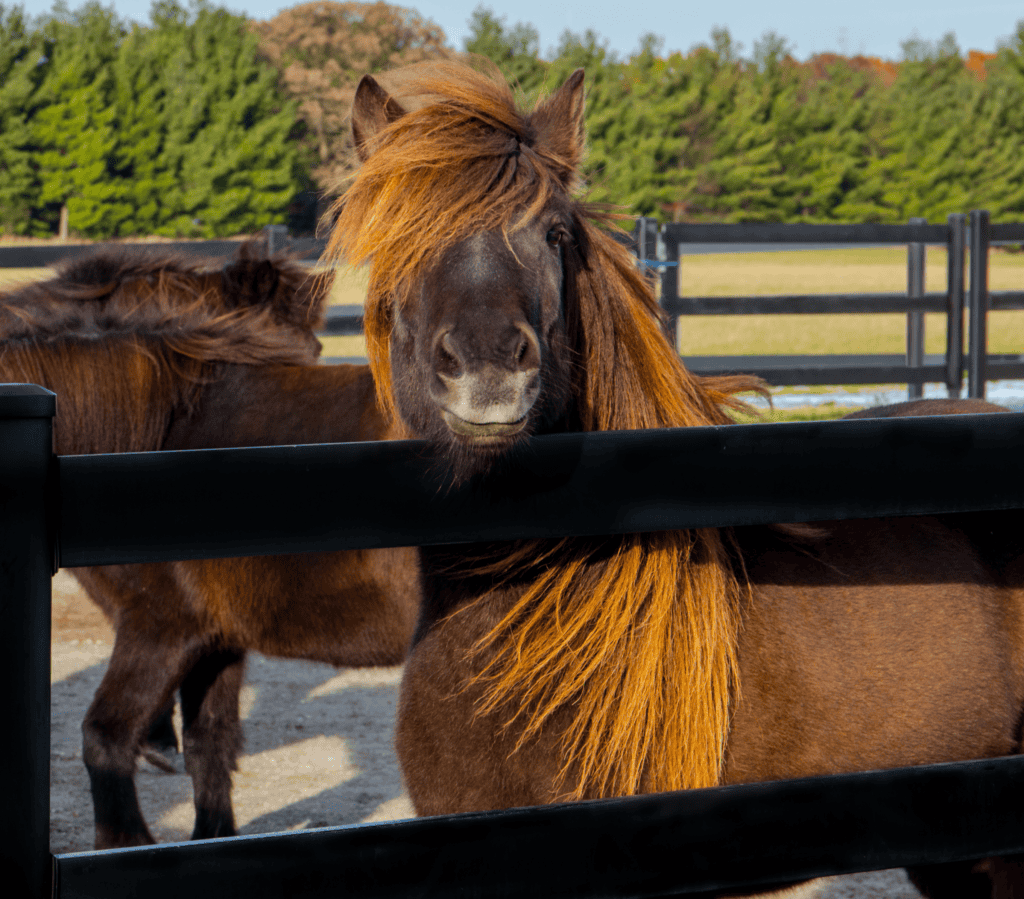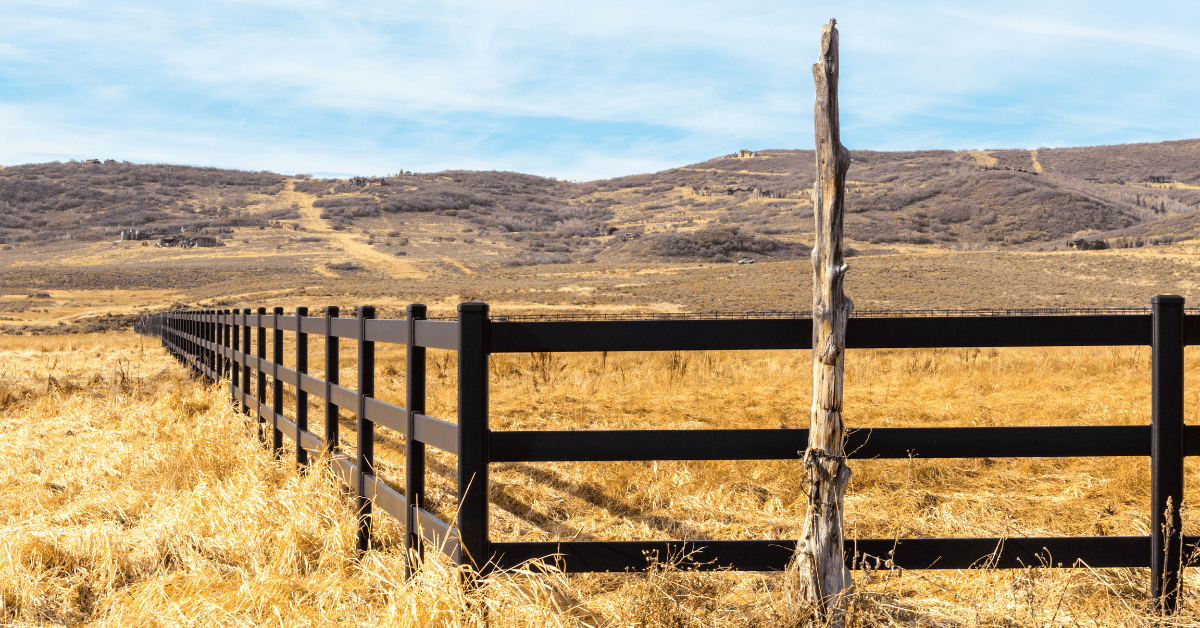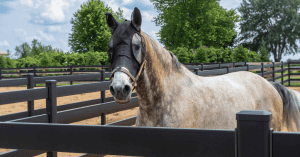There’s not usually a one-size-fits-all size when it comes to horse fencing. You’ll need to consider a variety of factors that go beyond mere aesthetics—it’s about the safety and security of your horses, the integrity of your property, and even compliance with local regulations.
A fence that’s too low can invite escape attempts and unwanted visitors, while one that’s too high may be unnecessary and costly. Finding the perfect balance is key to creating a harmonious environment for your equine companions (and your budget).
This guide will walk you through everything you need to know and consider to find the perfect height for your horse fence.
Whether you’re a seasoned equestrian or new to horse ownership, you’ll walk away with the confidence to pursue your fencing investment. And with the customizable options offered by Buckley Fence’s Steel Board designs, you’ll discover that achieving the perfect height can be practical, affordable, and downright elegant.
Why Fence Height Matters
Your fence height isn’t an arbitrary decision. It plays a fundamental part in the safety and well-being of your animals—and there are also legal factors to consider.
The primary purpose of a horse fence is to keep the animals contained safely within the boundaries of your property. A fence that is too low poses a risk of horses jumping over and potentially sustaining injuries or becoming lost. It also increases the risk of predatory animals gaining access to foals or smaller breeds.
Conversely, an unnecessarily high fence can be intimidating and stressful for the horses, which could lead to behavioral issues. The right height fosters a secure environment where horses can roam freely and comfortably.
Fence height can also be dictated by local zoning laws, which may specify minimum or maximum heights for livestock fencing. Non-compliance can lead to legal issues or fines.
Additionally, insurance policies for farms and livestock often have stipulations regarding fencing. Adequate fence height (per the policy requirements) is essential to guarantee coverage in the event of an accident or escape. Your insurers may not honor claims if they find that the fencing was below the recommended height, leaving you vulnerable to significant financial losses.
Factors That Influence Horse Fencing Height
 While you’ll find plenty of general rules of thumb on the internet or from equestrian experts, your unique individual factors will play an important part in figuring out the right horse fencing height. Here are the factors you’ll want to consider as you evaluate your fence needs:
While you’ll find plenty of general rules of thumb on the internet or from equestrian experts, your unique individual factors will play an important part in figuring out the right horse fencing height. Here are the factors you’ll want to consider as you evaluate your fence needs:
- Breed and Size of Horses: Different horse breeds have varying sizes and physical capabilities. Larger breeds, such as draft horses, require taller fences as they can easily step over or jump barriers that are too low. A general rule of thumb is that the fence should be at least shoulder height of the tallest horse in the paddock to prevent escape and ensure containment.
- Behaviors and Temperaments: The individual personality and behavior of a horse can greatly influence the necessary fence height. Horses known for their jumping prowess or those particularly active and playful may require higher fences to discourage jumping. Horses prone to spooking might also benefit from a taller fence as a visual barrier to outside stimuli.
- Local Wildlife: In rural areas, the presence of wildlife, such as deer, can affect the required height of horse fencing. A fence that is too low may not deter deer from jumping into enclosures, which can lead to injuries for both the deer and the horses. Similarly, areas with predators like coyotes or bears may require a fence design that considers both height and sturdiness to protect the horses.
- Zoning Laws and Regulations: Zoning laws may impose specific requirements to maintain uniformity within the community or to adhere to safety standards. It’s essential to check with local authorities to ensure that your fence meets all legal requirements, which can vary widely from one area to another.
- Visibility: A fence should be easily visible to the horses to prevent them from accidentally running into or jumping over it. This may mean adding additional height and features to the fence to enhance visibility in certain conditions.
- Topography: The lay of the land can influence fence height. On uneven terrain, the fence may need to be taller to maintain a consistent barrier as the ground level changes.
How to Find the Perfect Height for Your Horse Fence
Determining the right height for your horse fence is a process that involves a clear understanding of your current needs and future plans. Here’s how to ensure that your fencing decision is the right one for your horses and your property:
1. Determine Your Horse’s Needs
The first step is to evaluate the specific characteristics of your horses. Consider their breed, size, and jumping ability. Observe their behavior patterns: Are they curious and prone to exploring, or are they more sober? Do they have a history of attempting to jump over fences, or are they content within their current boundaries?
Tailoring the fence height to your horse’s individual needs can prevent injuries and escapes.
2. Consult With Equine Experts

Equine veterinarians, experienced horse trainers, and equine behaviorists can offer invaluable advice on the appropriate fence height. These professionals understand the nuances of horse behavior and can provide recommendations based on the collective experiences of a wide range of horse breeds and temperaments.
Their insights can guide you toward a fence height that is safe and effective for your specific situation. Need additional help when buying your fence? Talk to our fencing experts at Buckley Fence—they can help set you up with 2 to 5-rail fences with variable heights to meet your needs.
3. Consider Future Needs
While it’s important to address the immediate requirements of your horses, it’s equally crucial to plan for the future. Will you be acquiring taller or more active horses? Are there changes in land use or property layout on the horizon? By anticipating these changes, you can choose a fence height that accommodates potential new needs, saving you from costly alterations down the line.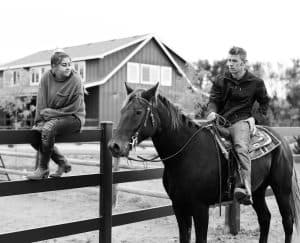
4. Balance Safety with Aesthetics
While safety is the prime concern, the visual impact of your fence on the property’s appearance shouldn’t be overlooked. A fence that is too tall might obstruct views and affect the property’s open feel, while one that is too short may not provide the visual boundary you desire.
Build the Right Fence with Customizable Steel Board Options
Building the ideal fence for your equine companions involves not just the right height but also the right materials and design. Buckley Fence’s steel board options offer a versatile solution that can be customized to meet a wide range of needs.
Design Flexibility
Buckley Fence’s steel board fencing systems are designed with flexibility in mind. Whether you require two rails for lower height needs or up to five for maximum height and security, the system can be tailored to your specific requirements.
The variable height options allow you to create a fence that is just the right size for your horses, taking into account their breed, size, and jumping prowess.
Long-Term Investment
Choosing a durable material like steel for your horse fence is a long-term investment. Steel offers unparalleled strength and longevity, standing up to the rigors of equine activity and harsh weather conditions without succumbing to the wear and tear that can affect less durable materials.
With a Buckley Fence, you can rest assured that the height you choose will be maintained over the years without the sagging or breaking that can occur with wood or vinyl options.
Build Your Fence for Today and Tomorrow
Selecting the right height for your horse fence is a decision that marries function with form and safety with aesthetics. It’s about creating a secure environment for your horses to thrive and a boundary that complements the natural beauty of your property.
In the end, the perfect fence height respects the needs of your horses, aligns with legal and insurance requirements, and reflects your personal style. Invest in a fence that’ll last you today, tomorrow, and beyond with Buckley Steel Board Horse Fencing. Request a quote today to kickstart your better future.
